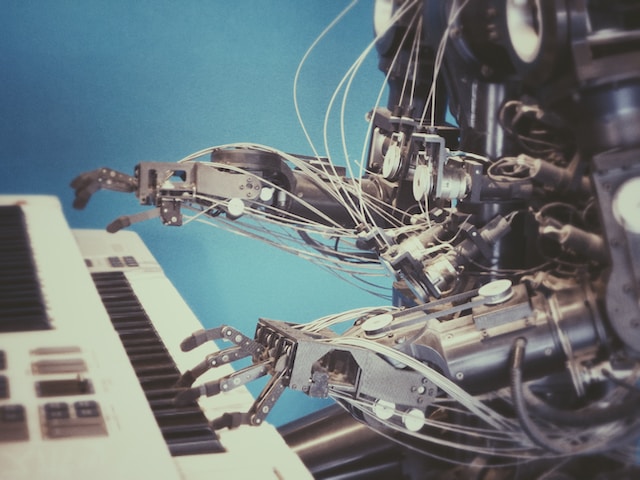According to the Collins English Dictionary, artificial intelligence (AI) is the word of the year in 2023. With how popular it’s become over the past twelve months or so, no wonder there are all kinds of false assumptions surrounding AI.
Some believe that it’s about to destroy humanity. Others are less ambitious, but despite the sensational concerns, they consider AI a better essay writer than a human being. Spoiler alert: both are wrong. So, let’s debunk common myths about AI. Is save my grade legit a valid concern in this context? Let’s explore the realities of AI’s impact on academic performance.

#1 AI Is Capable of Developing Its Own Goals
One of the most popular misconceptions about AI is that it can develop its own goals and ambitions over time. That’s where the popular “evil AI” trope widely used in sci-fi and publications that thrive on the “humanity is doomed” mindset comes from.
In reality, though, AI operates strictly within the parameters set by its programming. Therefore, it has no independent will and can’t develop its goals.
An example would be an AI system playing chess. The mistaken view is that it is actively trying to win the game for its satisfaction. That’s not the case whatsoever. AI is merely executing programmed strategies to achieve an outcome defined by its creators. As simple as that. So, yes, it’s perfectly fine not to say please and thank you to ChatGPT; it’s not out to get you.
#2 AI Will Eventually Surpass and Replace Humans
The most common myth about AI is that it is on its way to replacing humans and is about to leave most of us out of jobs. This misconception is rooted in the fear that AI will become so advanced that it will surpass human capabilities in every field, rendering human effort obsolete.
While AI is improving efficiency and automating routine tasks, there’s a vast spectrum of human capabilities that AI can’t replicate, such as emotional intelligence. So, at least now, the only jobs threatened by AI consist of routine and repetitive tasks. Those are the jobs that most people don’t get any satisfaction or sense of accomplishment from.
#3 AI Is Infallible and Unbiased
Even the people who realize that AI won’t be able to perform managerial tasks competently any time soon seem to be under the impression that it’s completely unbiased. But this couldn’t be further from the truth. Any AI system is only as good as the data fed during training. If the data are biased (which most are inherently so), AI will be as well.
That’s one reason why relying on AI to build an advanced and well-thought-out argument is not the best idea. A competent SaveMyGrade writer will do a much better job writing your essay than Jasper or ChatGPT because they are aware of their implicit biases; AI systems aren’t. With data typically lacking diversity and representation, AI tends to be racist, sexist, and otherwise discriminatory.
#4 AI Can Learn and Evolve on Its Own
The myth that AI can independently learn and evolve like a living organism is a massive misunderstanding of how AI works. AI systems can’t operate without continuous human input. Initial programming matters, sure, but so does machine learning, which can’t happen without human intervention. Contrary to what sci-fi horror books and movies tell us, no AI system evolves spontaneously.

#5 AI Has the Ability to Understand Emotions
Many people believe that AI can understand emotions, and the growing popularity of emotional support chatbots reinforces this belief. But that’s not true. While advancements in AI have led to the development of systems that can recognize facial expressions and analyze speech patterns, these are far from actual emotional understanding.
AI can mimic empathy and emotional responses based on programmed algorithms, but it lacks the genuine emotional depth and comprehension that humans have. The subtleties and complexities of human emotions are something AI cannot fully grasp. For example, an AI might recognize a smile and interpret it as happiness, but it can’t understand the nuanced emotions behind that smile (say, if it’s a nervous smile or a joyful one).
#6 AI Can Completely Automate Creative Processes
Here comes another reason why it’s a bad idea to entrust ChatGPT with your college assignments, even more so if they require even an ounce of creativity. Sure, AI has made inroads into creative fields. It successfully assists creatives in graphic design, music composition, and writing.
But it has no intrinsic creativity and, most importantly, no emotional depth (see #5). That’s why if you ask an AI-powered writing tool to create a short story about something related to human emotions, the result will be either painfully cliched or so wrong it’s absurd. AI can offer you a few interesting ideas to develop but doesn’t come even close to the creative potential of a human being.
#7 AI Works the Same Across Different Cultures and Languages
Few people know that AI’s effectiveness varies across cultural and linguistic contexts. Languages have nuances, idioms, structures, and cultures have unique contexts and norms. As a result, AI algorithms trained on data from one language or culture may not perform well when applied to another. Once again, AI is only as good as the data it is trained on. The amount of data used must be enormous for an AI system to be more or less universal.
An Afterword
Although AI is a powerful tool with immense potential, we must recognize its capabilities and limitations. This is why it’s crucial to understand that not everything we hear about AI is true. Not only is it not out to get us, but at this point, it’s not even advanced enough to competently replace humans in any task that requires critical thinking, emotional intelligence, and creativity.
So, think twice before asking an AI writing tool to complete your homework for a Creative Writing class.
